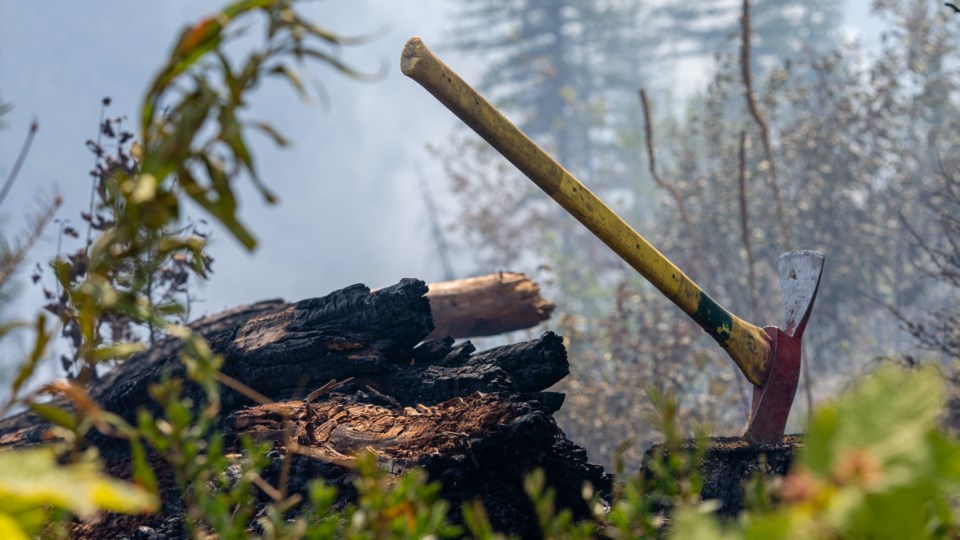A B.C. man has been ordered to pay the province $100,688 for what it cost the government to fight a wildfire he ignited in 2019.
The decision, upheld by the Forest Appeals Commission, came following a complaint by the BC Wildfire Service (BCWS), after they responded to a 2019 wildfire in the Kispiox Valley of B.C.’s Skeena-Stikine region. The decision comes amid one of B.C.’s worst wildfire seasons on record and shows the liability individuals can face when they don’t plan before lighting a fire.
“The gravity and magnitude of the contravention is high, or serious,” wrote the commission panel chair Cynthia Lu in her decision.
“The total area burned was 11.5 hectares but could have been much larger if BCWS was not immediately dispatched and on the scene within the hour.”
The incident dates back to March 31, 2019, when Realtor Eldon Whalen lit a burn pile on his property. Over the coming weeks, he returned regularly with buckets of water and hand tools to monitor the fire, according to the decision.
But 40 days later, Whalen was driving by the pile when he saw smoke and flames. He called 911 and told dispatchers he didn’t have the gear or water to fight the fire. Firefighters arrived with helicopters, ground crews, air tankers and fire retardant.
“Lots of rural properties in area, BC Wildfire Service responding,” warned the Bulkley Valley Amateur Radio Society on Twitter.
It took six days for the BC Wildfire Service to get the fire “under control,” during which locals notified neighbours and helped move animals out of the path of the flames. Five weeks later, the fire was extinguished having burned mostly private land, threatening homes and infrastructure and burning fence lines.
Later investigations determined the wildfire was sparked by the open fire “left unattended and not extinguished, which smouldered and escaped due to fire creep and gusting winds weeks after its initial ignition.”
Wildfire Act opens door for government to recoup losses
According to B.C.’s Wildfire Act, the government can levy administrative penalties, charge for the value of damaged timber and other resources, and recoup the costs of firefighting if the wildfire started in contravention of a burn ban or other fire-prevention provisions.
The law states that an individual may “light, fuel or use a category 2 open fire in or within 1 km of forest land or grass land” if they are not banned from doing so by some other prohibition, it’s safe to do so, and if the person makes a fuel break around the burn area.
While a fire is burning, they must maintain the fuel break, make sure they have an adequate fire suppression system on hand, and watch and patrol with at least one firefighting hand tool to ensure the fire doesn’t escape. And before leaving the burn area, they must ensure the fire is extinguished.
Whalen, for his part, contended the burn pile was not left unattended and that he satisfied the provisions in the Wildfire Act. He said he believed “embers travelled underground, through water-soaked ground through some fuels before reaching the forest.”
B.C. government submitted Whalen provided “no credible evidence” that the fire was extinguished before he left the area. They pointed to the findings of wildfire investigators who said the burn pile was not extinguished and was unattended when it escaped, creeping with the wind.
The province submitted that as a real estate agent, Whalen should have had an "above average understanding of rules and regulations regarding use of land," though Whalen disputed that claim.
Embers, underground burning counts as fire, rules commissioner
In her decision, Lu found the Wildfire Act makes no mention of “embers” and that Whalen failed to show the commission why they should not be included in the definition of “fire.” Lu said she saw no evidence that suggests “fire” should be restricted to visible flames or smoke, or that it must burn above ground.
Whalen “has not provided any expert evidence that suggests it is reasonable to believe, a fire can be considered extinguished due to the lack of visible smoke,” Lu wrote.
The decision also notes that photos taken a day before the fire spread showed there was no snow on the ground, something that contradicted Whalen’s claim he used snow and water as a fire break. Lu also wrote there was no indication Whalen pulled apart the burn pile to look for hot spots and determine if the fire had been extinguished before it got out of control.
“Prior to the burn, the [Whalen] did not contact any relevant authorities, including the local fire department, the Ministry of Forests, or BCWS, in order to learn more about open burning regulations, expectations, hazards, and potential consequences,” found Lu.
“Relying on self-directed online research and the anecdotal knowledge of neighbours does not demonstrate a reasonable standard of care.”
On top of the firefighting costs, the commission ordered Whalen to pay a $3,000 administrative penalty due to the “gravity and magnitude” of the contravention.
Lu provided a list of what Whalen could have done to ensure the burn pile was safe, noting none of it required a “superhuman” effort.




